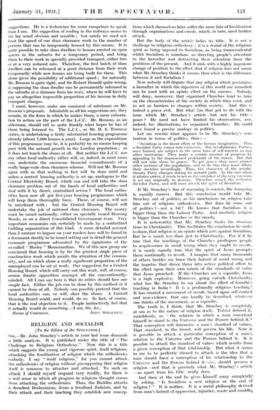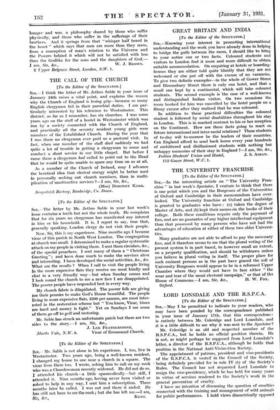RELIGION AND SOCIALISM
[To the Editor of the SPECTATOR.] SIR,—Mr. John Strachey's article in your last issue demands a little analysis. It is published under the title of " The Challenge to Religious Orthodoxy." Now this is a title which suggests the young and vigorous spirit, itself religious, attacking the fossilization of religion which the orthodoxies embody. I say " itself religious," for you cannot attack . the orthodoxies of religion without presupposing that religion itself is common to attacker and attacked. To such an attack I should myself respond very readily, for there is a real sense in which all progress in religious thought comes from attacking the orthodoxies. Thus, the Buddha attacks a decadent Brahminism, Jesus a fossilized Judaism, and by their attack and their teaching they establish new concep-
tions which themselves later suffer the same fate of fossilization through organizations and creeds, which, in turn, need further attack.
But the body of the article belies its title. It is not a challenge to religious orthodoxy ; it is a denial of the religious spirit as being opposed to Socialism, as being transcendental whilst Socialism is mundane, as directing people's attention to the hereafter and distracting their attention from the problems of the present. And it ends with a highly ingenious change of position to the effect that if religion does not mean what Mr. Strachey thinks it means, then what is the difference between it and Socialism ?
Now nobody will dispute that any religion which postulates a hereafter in which the injustices of this world are remedied can be used with an opiate effect on the 'masses. Nobody will deny, moreover, that organized Churches tend to take
on the characteristics of the society in which they exist, and to act as barriers to changes within society. And this is indeed a grave evil. But what has that got to do with the issue which Mr. Strachey's article—but not his title— poses ? He need not have limited his observation, nor, indeed, his illustrations, to organized Churches. He could have found a precise analogy in politics.
Let me rewrite what appears to be Mr. Strachey's con- tention in terms of politics, thus
Socialism is the finest effort of the human imagination. Thus a Socialist Party comes into existence. But revolutionary Parties, once formed, are subject to the same laws of self-interest as any other institution. They make a certain amount of progress by appealing to the dispossessed proletariat of the towns. But' this will not take them to power. To get power they must attract other sections of the population, and to do this they must dilute their doctrine accordingly. Thus, the character of the revolu- tionary Party changes during its onward path. In the end when it attains power, it tends to act as the caretaker of the very interests it set out originally to destroy. Therefore attack the orthodox Socialist Party, and still more attack the spirit of Socialism."
If Mr. Strachey's line of reasoning is correct, the foregoing is equally correct. But this conclusion would take Mr. Strachey out of politics, as his conclusions on religion take him out of religious orthodoxies. But does he conic out of politics ?—not a bit !. He knows that Socialism is a bigger thing than the Labour Party. And similarly, religion is bigger than the Churches or the creeds.
It is noteworthy that Mr. Strachey limits his observa- tions to Christianity. This facilitates the conclusion he seekS to draw, that religion is an opiate which acts against Socialism, But he is much less than just to Christianity. For if it be true that the teachings of the Churches predispose people to acquiescence in social wrong when they ought to revolt, it is surely equally true that the spirit of Jesus prompts them continually to revolt. I imagine that many thousands of others besides me trace their hatred of social wrong and the impetus that drove them into active political effort to the effect upon their own minds of the standards of value that Jesus preached. If the Churches are a soporific, Jesus is a high explosive. Moreover, going outside Christianity, what has Mr. Strachey to say about the effect of Gandhi's teaching in India ? It is a profoundly religious teaching ! It has created a movement of revolt, based upon self-control and non-violence, that can hardly be described, whatever one thinks of the movement, as a soporific.
The truth is, I think, that Mr. Strachey is completely at sea as to the nature of religion itself. Tolstoi defined it, matchlessly, as " the relation in which a man conceived himself to stand to the Universe and the Powers behind it." That conception will determine a man's standard of values. That standard, in the broad, will govern his life. Now it is possible to attack a particular conception of a man's relation to the Universe and the Powers behind it. It is possible to attack the standard of values which results from a given conception of that relationship. But what it seems to me to be perfectly absurd to attack is the idea that a man should have a conception of his relationship to the Universe and the Powers behind it—i.e., should possess a religion--and that is precisely what Mr. Strachey's article —as apart from his title— really does.
And then at the end he gives himself away completely by asking, " Is Socialism a new religion or the end of religion " It is neither. It is a social philosophy derived from men's hatred of oppression, injustice, waste and muddle,
hunger and war, a philosophy shared by those who suffer physically, and those who suffer in the sufferings of their brothers. And it springs from that "whisper half heard in the heart " which says that men are more than they seem, from a conception of man's relation to the Universe and the Powers behind it which will not be satisfied with less than the Godlike for the sons and the daughters of God.—







































 Previous page
Previous page